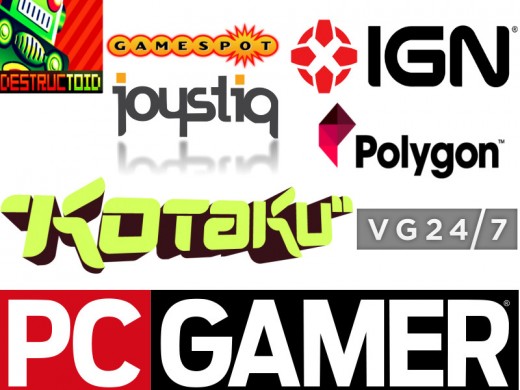The Problem of Modern Games Journalism

What Gaming Journalism is Today:
There’s a reason that the average gamer distrusts “Gaming Journalism”. It stems from the implication that gaming journalists are just glorified advertisers for major gaming publishers. The writers on many gaming sites write pieces that hype up a game based solely on screenshots, trailers and maybe some gameplay footage they recorded at a games convention.
Journalists often hype up games before they come out because they want ad revenue for their website, and if you see a headline for an article about a game that hasn’t been released yet, then the article might make you excited and you might pre-order the game.
The Hype Train and Pre-Order Culture:
I love videogames and I do get excited to play them. The thing is, they’re $60, that’s a lot of money to buy just one item, and depending on how well you play, it can be from 4-12 hours for games that are not long story-driven role playing games, or RPGs.
You’re paying $60 for something that maybe, you’ll spend half a day on in total, then you might put it away and never play it again or go trade it in for some other new release when it comes out.
I rarely buy videogames at full price because $60 is ridiculous, and because videogames have a ridiculously fast depreciation rate. I just used Decluttr to get some money for some old PlayStation 3 videogames and I barely got anything for them, it’s sad because there was no way I could sell them for a decent price, because my games weren’t rare or out of pint.
Most articles constantly hype up a game, making it seem like unless you pre-order now, you won’t be able to get it on release day, which isn’t true of course, you can walk into your local store and buy the newest game release or download on Steam or GOG.com if your PC can run it, so there is no way you cannot get a game unless it’s a limited collector’s edition of a game that is likely to go out of print before the regular version of the game does.
Sure there’s pre-order DLC, but that DLC will also be included in a “Game of the Year” or “Complete Edition” rerelease, so you might as well wait for that release of the game rather than pre-order the game!
They Hype You Up and then act Disappointed:
I still remember all the hype for “No Man’s Sky”, all the press excitement about how this was going to be an amazing game that it would be an accomplishment for Hello Games, and then it came out and disappointed everyone after a few hours of gameplay.
I remember when IGN hyped up this game and ended up giving it a 7!

Milking You for DLC:
Another problem with “games journalism” is that they also hype up DLC, most of it should have been in the base game, but hey, it’s okay because it’s “more content”.
They also downplay when some companies do shady things, like when publishers lock half a fighting game’s roster behind paid DLC and they only cover it because the community complained about it.
Some Game Reviews are Glorified Sales Pitches:
I constantly see games get “high scores” from large gaming sites, and then they go buy it, and then they complain that the game, I’m looking at you, Cal of Duty, has no innovation.
And why wouldn’t major game websites give AAA games a good score, when you get a unique press release copy of the game, for free sometimes, or the Publisher flies you out personally to spend time playing the game before release, it’s hard not to give a game a high score when you get nice incentives to do so.
And while you can ask for free games you’re not guaranteed to get them anyway.
And while gamers often accuse reviewers of being “paid off”, you could say that they are paid off, in a way, because it might be a “loss” of $60 for the Publisher to give a reviewer that digital game key, but a great review with a lot of traffic to a site could mean sales in the thousands for a publisher, because they know that word of mouth or a review that praises a game and gets a gamer to spend $60 make up for giving away that free game key.
Reader Poll:
Do you trust modern "Game Journalism"?

Social Media Influencers Are Prone to “Mommy Blogging”:
Popular YouTube channels can easily influence their large viewing audience by showcasing a game, so Publishers try very hard to get them to play their release, hoping that YouTube hits will convert into sales for the game.
Because a lot of YouTube personalities come off as your “normal, average gamer,” they are not your normal average gamer, most normal people don’t get free copies of games sent to them by game publishers!
Most people watching a YouTube personality talking about a game want them to be open and honest with them, but some personalities, such as PewDiePie did gaming videos that were promoting games that didn’t look like promotions, although he put a disclaimer in his video description, he put it below the “show more” tab, which most YouTube viewers don’t click on, it got him in and Warner Brothers Interactive in trouble with the FCC, it was more on Warner Brothers side han PewDiePie because he put a disclaimer in his description, WB wanted him to hide that it was a promotional video.
Between YouTube personalities “mommy blogging”, saying nice things so they’ll be sent more free things and publishers making shady deals to get more sales, it’s just sad that it can be hard to trust anyone when it comes to how they really feel about a videogame when you don’t know if you’re just watching or reading a glorified ad so that publisher can sell you a game via a YouTube personality or gaming website.

How Do you tell if someone’s being Honest:
You can usually tell if someone is being honest with you if they follow FCC guidelines about ads and promotion, which means if you receive a product for free for promotion or review, you are required to state in your video or in your article that you received this product for free.
Also, ask yourself, do they sound push and overly promotional?
Usually when someone is doing a paid promotional video or article, they will really push you to buy the product. They’ll do it because they’re being paid to do it, and usually you can really tell when it’s clearly an advertisement.
I remember the XB1M13 scandal when Microsoft and Machinima was paying YouTube personalities big and small $3.00 CPM for videos that would promote the Xbox One game console. That may seem silly for $3.00 per 1,000 views, but considering that YouTube reaches millions of people and the potential to sell game consoles that seemed like a surefire way to market the console.
The YouTube audience expects honesty from these personalities, and to see that it was incredibly easy to turn them into glorified salesmen and women is really sad.
Not everyone is trying to Sell You a Game, So Don’t Always fall for the Hype:
It’s fine to be excited for games, I get excited for games, but you shouldn’t believe games journalists when they treat the next game like it’s going to be the best thing you will ever play in your gaming life, which is what a lot of those fluffy hype pieces are.
Just don’t believe that you’ll love a game you’ve never played just because someone said you will when they’ve never played it either. There’s only so much you can see from a gameplay video or read an article before you decide if you want the game for yourself. If anything else, you can get the game from Red Box or your friends and not pay a lot for it. You shouldn’t just throw $60 to $100 because someone says this game might be great unless you were intending to buy it anyway.
Just be careful when someone hypes up something, you might have buyer’s remorse if you do.
© 2018 ReViewMeMedia








